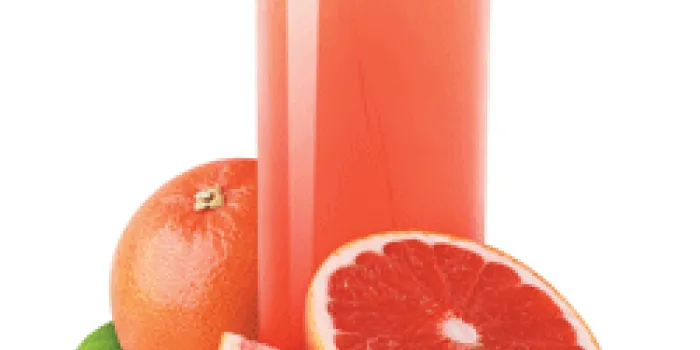That tart and tangy glass of grapefruit juice looks like the perfect way to down your morning medication. After all, it has no sodium or cholesterol, and it packs more than 100% of your daily vitamin C. But lurking within that innocent-looking breakfast beverage is a chemical that can make drugs deadly.
More than 20 years ago, David G. Bailey, PhD, emeritus professor of physiology, pharmacology and medicine at the University of Western Ontario in Canada, discovered that men on felodipine, a calcium channel blocker prescribed to treat high blood pressure, had dangerous amounts of the drug in their system after taking it with grapefruit juice. The bioavailability, or amount of drug that reaches the patients’ circulation, averaged three times higher than when taken with water.
In 2012, Bailey and co-authors published an updated study of grapefruit-sensitive drugs in the Canadian Medical Association Journal. They identified more than 85 prescription drugs that should not be taken with grapefruit juice. (See sidebar, “Prescription Drugs That Interact With Grapefruit Juice.”) Surprisingly, the amount of grapefruit juice causing problematic reactions was only 200–250 milliliters—6.76 to 8.45 ounces—when taken with the medication in as few as three days in a row. The grapefruit juice-reacting drugs include antibiotics, cholesterol-lowering drugs called statins and common pain relievers.
Grapefruit, Seville oranges, tangelos and pomelos all contain furanocoumarin, the chemical that causes the drug interaction. Furanocoumarin blocks CYP3A4, an enzyme in the intestines that breaks down drugs before they are absorbed in the bloodstream. That means excess amounts of the drug enter the blood, causing a host of reactions.
The adverse effects from grapefruit juice depend on the medication taken. They can include dizziness, drowsiness and gastrointestinal bleeding. One severe reaction called rhabdomyolysis, or muscle breakdown, causes muscle fibers called myglobin to be released into the bloodstream, eventually impairing kidney cells. Other severe side effects include liver damage, respiratory depression and torsade de pointes, an elevated heartbeat caused by rapid contraction of the ventricles. Torsade de pointes is a life-threatening arrhythmia that can be fatal. In fact, more than half of the drugs on Bailey’s 2012 list can cause sudden death.
Because some conditions require an exact amount of a drug, such as organ transplants, even small differences in the dosage can produce unwanted side effects. Further, because individuals have different amounts of the enzyme CYP3A4 in their intestines, their reactions to grapefruit juice while on the same medication may vary.
Consult your pharmacist about your prescription drugs and possible interactions. If you’re gaga for grapefruit juice, you may have to get your vitamin C elsewhere.

